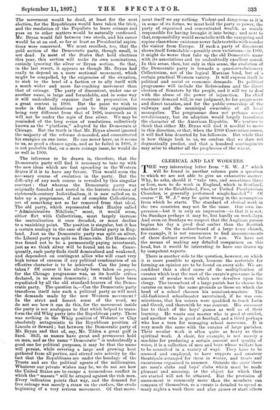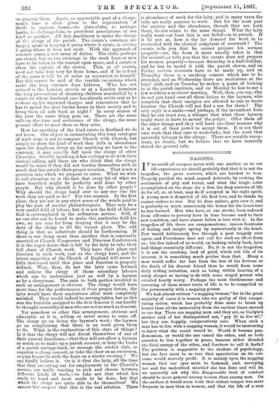CLERICAL AND LAY WORKERS. T HE very interesting letter from "
R. W. J." which will be found in another column puts a question to which we are not able to give an exhaustive answer. Why, he asks, should it "take two, and sometimes three or four, men to do work in England, which in Scotland, whether in the Established, Free, or United Presbyterian Churches, is generally performed single-handed" ? Of course "R. W. J." may be quite wrong in the assumption from which he starts. The standard of clerical work in the two countries may not be the same. Our own im- pression—but it is only an impression—is that it is not. On Sundays perhaps it may be, but hardly on week-days. And even on Sundays we suspect that the Anglican parson begins his day a good deal earlier than the Scottish minister. On the notice-board of a large town church, for example, it is not uncommon to find announcements of three distinct services before 9 a.m. We have not the means of making any detailed comparison on this head, but it would be interesting to have one drawn up by competent experts.
There is another side to the question, however, on which it is more possible to speak, because the materials for forming an opinion are to be found on every side. We are confident that a chief cause of the multiplication of curates which is at the root of the curate's grievance is the amount of secular work which now devolves upon the clergy. The incumbent of a large parish has to choose his curates on much the same grounds as those on which the head of a school chooses his assistant-masters. The old-fashioned schoolmaster ascertained, if he was con- scientious, that his ushers were qualified to teach Latin and Greek, and therewith he was content. His successor has to think of the boys' games as well as of their learning. He wants one master who is good at cricket, and another who is good at football, and a third perhaps who has a turn for managing school museums. It is very much the same with the curates of large parishes. Their secular work is often quite as heavy as their spiritual work. A choir, for example, is not merely a machine for producing a certain amount and quality of voice, it is a collection of men and boys whose welfare has to be consulted in a variety of ways. They have to be amused and employed, to have suppers and amateur theatricals arranged for them in winter, and treats and excursions organised in summer. Outside the choir there are men's clubs and boys' clubs which must be made pleasant and amusing, or the object for which they are started will not be attained. But the provision of amusement is commonly more than the members can compass of themselves, so a curate is detailed to spend so many nights a week there and play games or start others on playing them. Again, an appreciable part of a clergy- man's time is often given to the organisation of thrift in various forms,—to slate-clubs, to savings- banks, to clothing-clubs, to provident associations of one kind or another. All this machinery is under the charge of the clergy of the parish. The curate's evenings are largely spent in keeping it going where it exists, in setting it going where it does not exist. With the approach of summer comes a new array of duties. The clubs perhaps are closed, but on two evenings in the week boys or men have to be taken to the nearest open space, and a curate is often the captain of the eleven. This, at all events, need not take him very far from home, and if he is fond of the game it will be of value as recreation to himself. But this cannot be said of the terrible excursions which make the long summer days hideous. Who has not noticed in the London streets or at a London terminus the long processions of shouting children marshalled by a curate on whose forehead care has already set its seal as he reckons up his wayward charges and remembers that he has to spend the next twelve hours in their society and to bring them all safe back at night ? In every season of the year the same thing goes on. There are the same calls on the time and endurance of the clergy, the same general effort to meet them as they arise.
How far anything of the kind exists in Scotland we do not know. Our object in enumerating this long catalogue of work done is not to compare Church with Church, but simply to show the kind of work that falls in abundance upon the Anglican clergy as, for anything we know to the contrary, it may equally fall upon the clergy of other Churches. Strictly speaking, it has nothing to do with their clerical calling, and there are who think that the clergy would be wiser if they did not burden themselves with so much that lies outside their proper vocation. That is not a question into which we propose to enter. What we wish to call attention to is the fact that every bit of what we have described might be perfectly well done by other people. But why should it be done by other people ? Why should the clergy hand over to any one else the work they are paid to do ? For two reasons. In the first place, they are not in any strict sense of the words paid to play the part of secular philanthropists. That may be a very useful field of labour, but it is not the field of labour that is contemplated in the ordination service. Still, if no one else can be found to make this particular field his own, we are very far from denying that it may be the duty of the clergy to fill the vacant place. The odd thing is that no substitute should be forthcoming. If there is one thing more than another that is constantly asserted at Church Congresses and Diocesan Conferences it is the eager desire that is felt by the laity to take their full share of Church work. They have their place and function in such work, just as the clergy have, and the latent capacities of the Church of England will never be fully developed until this place and function is properly defined. Why, then, do not the laity come forward and relieve the clergy of those secondary labours which can be undertaken just as well by a layman as by a clergyman. The gain to both parties involved in such an arrangement is obvious. The clergy would have more time for the performance of their proper duties ; the laity would have their aspirations after work completely satisfied. They would indeed be serving tables, but as this was the function assigned to the first deacons it can hardly be thought unworthy of men who are not so much as deacons.
Yet somehow or other this arrangement, obvious and admirable as it is, seldom or never seems to come off. The clergy go on doing the laymen's work ; the laymen go on complaining that there is no work given them to do. What is the explanation of this state of things ? Is it that the clergy will not divest themselves of any of their present functions,—that they will not allow a layman so much as to make up a parish account, or keep the books of a parish savings-bank, or manage the cricket club, or organise a cheap concert, or take the choir on an excursion, or play bagatelle with the boys on a winter evening ? We can hardly believe it. Or is it that the laity, all the time that they are crying out for employment in the Church's service, are really wanting to pick and choose between different kinds of work,—to take not that which lies ready to hand and most needs to be done, but that which the clergy are quite able to do themselves? We cannot but suspect that this is the real solution. There is abundance of work for the laity, and in many cases the laity are really anxious to work. But for the most part the anxiety and the abundance, though they are both there, do not relate to the same things. What the laity really want—at least this is our belief—is to preach. If it be not so, how is the lay demand for work to be reconciled with the clerical complaint of overwork ? The curate tells you that he cannot prepare his sermon properly—no, the form it more usually takes is that the incumbent tells you that the curate does not prepare his sermon properly—because Saturday is a half-holiday, and he has to spend it with the parish eleven, and on Friday certain accounts have to be made up, and on Thursday there is a smoking concert which has to be attended, and on Wednesday there are recitations at the boys' club, and on Tuesday he makes a point of looking in at the parish institute, and on Monday he has to say a few words to a mothers' meeting. Well, then, you say, why do not you hand over all these duties to the laymen, who complain that their energies are allowed to run to waste because the Church will not find a use for them ? The only reply is a smile—and perhaps, if the incumbent feels that he can trust you, a whisper that what these laymen really want is leave to mount the pulpit. Offer them all the other things and they will have excellent reasons why it is out of their power to accept them. It is not their own work that they care to undertake, but the work that naturally belongs to the clergy. There are notable excep- tions, no doubt, but we believe that we have correctly stated the general rule.



































 Previous page
Previous page